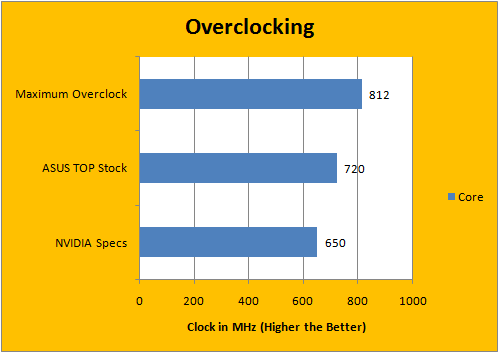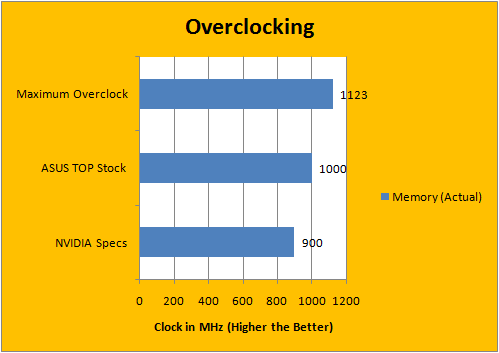Page 9 - Power Usage, Overclocking

The G94 core is actually very power efficient, as we can see from our charts above. Please note that the load conditions cannot be measured against no graphics card since the entire system is under load, and as such the CPU which will not limit to only graphics card power consumption. However, these figures are accurate against each other besides the 'None' value as 129W as a place filler. With that in mind, the 9600GT's power consumption reached a maximum of 227W from 167W -- which is pretty good. It's quite a bit less than the G92 8800GT, and in load conditions it's much better than the 3870 as well. The only difference is that the 3870 has ATI PowerPlay for dynamic speed and voltage adjustment for the card idling, and this reflects in the power consumption chart above.

At stock, the 9600GT core operates at 650MHz -- and Asus pulled it to a somewhat (But not overly) aggressive 720MHz. That's a 11% overclock out of the box. I managed to run it at 812MHz stable, which translates it to an impressive 25% overclock from stock or 13% increase from pre-overclocked speeds. The 162MHz/92MHz increase from each reference point, respectively, is quite impressive -- from my research even cream of the crop 9600GT cards maxes up in the early to mid 800MHz range.

The shader overclocking took me a lot of time to implement and test -- only because I've never expected it to reach this high, and every few MHz increments of setting and testing is super time consuming. Being that, we've finally hit a wall at 1997MHz -- from NVIDIA specifications of 1625MHz and Asus factory overclock's 1800MHz. That's an impressive 372MHz (23%) overclock from stock NVIDIA specifications, and a 197MHz increase (11%) from Asus TOP speeds.

The maximum overclock I was able to attain on the Asus 9600GT TOP was 1123MHz (2246MHz effective), from the Asus stock speed of 1000MHz -- essentially a 12% overclock and again, 25% faster than a generic 9600GT card. The memory themselves are actually rated at 1GHz. Generally speaking, you can expect the Asus 9600GT TOP to be 25% faster than a stock 9600GT in all areas -- whether it be the core, shader, or memory speed.
Page Index
1. Introduction, Specifications, Bundle
2. NVIDIA 9600GT Architecture
3. A Closer Look, Test System
4. Benchmark: FEAR
5. Benchmark: Prey
6. Benchmark: Half Life 2: Lost Coast
7. Benchmark: CS:Source HDR
8. Benchmark: 3DMark06
9. Power Usage, Overclocking
10. Noise Factor and Conclusion





